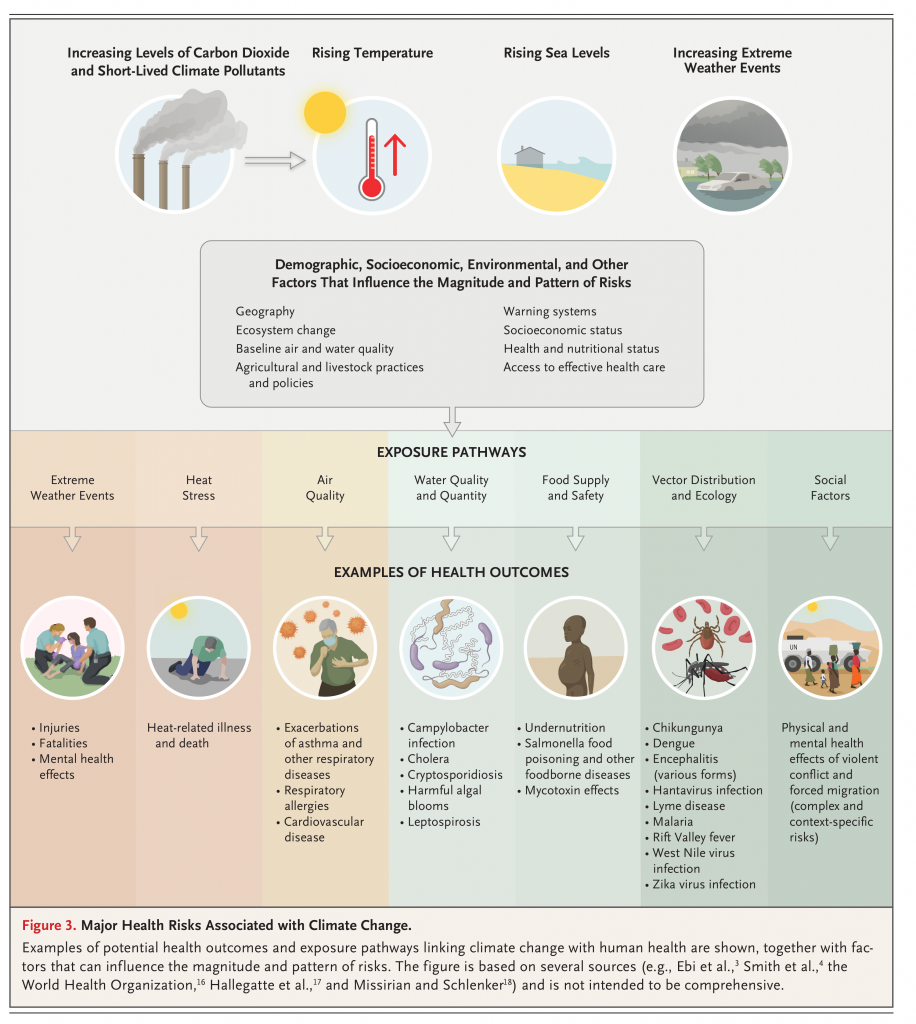I have recently come across two articles on climate change from a human health perspective, who urgently demand action to minimize climate-related threats to human health and related costs. These articles were published in one of the highest-impact medical journal, The New England Journal of Medicine.
Some highlights are the summary of climate change on human health, which are summarized i Figure 3 of Haines, 2019 [1].
In addition, Haines et al (2019) present some interesting health economic calculations regarding the association of carbon emissions and human health costs:
When high and low estimates for the value of a life saved (in U.S. dollars) are used and the marginal costs of reducing greenhouse-gas emissions are taken into consideration, the economic benefits arising from reduced air pollution range from $50 to $380 per ton of carbon dioxide worldwide and from $30 to $600 per ton in the United States.se
I think these health economic models – although they may be somewhat vague and based on strong assumptions – are very useful as risk communication statements, to convert the effects of problem behaviour (ie carbon dioxide emissions) to final (health) economic results, which may the most relevance for some groups in the human population. See also Solomon et al. (2019)on the same topic in the same issue.
Refs:
[1] Haines, A., & Ebi, K. (2019). The Imperative for Climate Action to Protect Health. New England Journal of Medicine, 380(3), 263–273. https://doi.org/10.1056/NEJMra1807873
[PDF]
[PDF]
[2] Solomon, C. G., & LaRocque, R. C. (2019). Climate Change — A Health Emergency. New England Journal of Medicine, 380(3), 209–211. https://doi.org/10.1056/NEJMp1817067
[PDF]
[PDF]
see also:
- Watts, N. et al. (2019). The 2019 report of The Lancet Countdown on health and climate change: ensuring that the health of a child born today is not defined by a changing climate. Lancet 2019; 394: 1836–78, https://doi.org/10.1016/S0140-6736(19)32596-6 [PDF]
- Institutionen för Medicin, Sahlgrenska Akademin (2020). Klimat och hälsa – En kunskapssammanställning (Rapport nr 3:2020). Göteborg Universitet. [PDF]
- Möjliga förändringar av sjukdomspanorama orsakade av framtida klimatförändringar – utifrån identifierade förändringar i sjukdomsförekomst identifiera läkemedelsbehov, diarienummer VKN 2020-0154. Hälso- och sjukvårdsförvaltningen, Region Stockholm [PDF]
- A WHO–UNICEF–Lancet Commission (2020). A future for the world’s children?, The Lancet, Volume 395, Issue 10224, Pages 605-658, ISSN 0140-6736, https://doi.org/10.1016/S0140-6736(19)32540-1, http://www.sciencedirect.com/science/article/pii/S0140673619325401.
